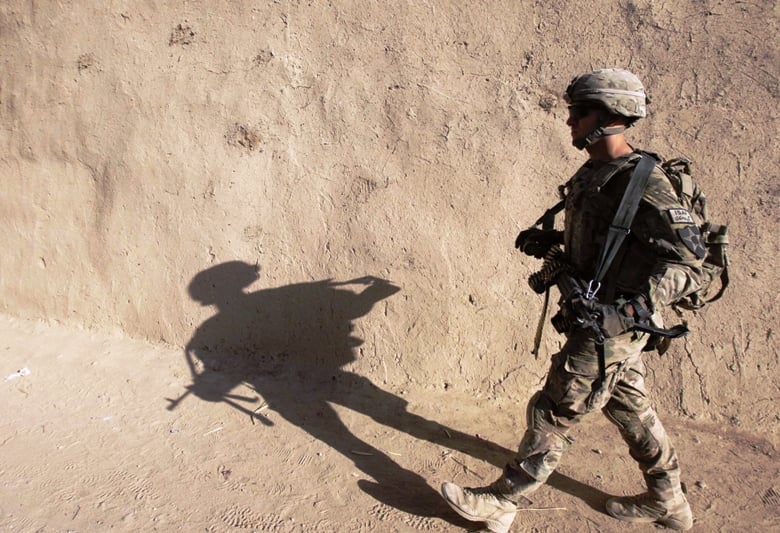
Robert Bales, 40, pleaded guilty in June to killing the villagers -- nine of them children -- in a deal brokered by his defense team to avoid the death penalty.
But seven survivors of the soldier's murderous rampage offered gut-wrenching testimony at an army hearing that must decide whether Bales will be allowed to seek parole after a minimum of 20 years behind bars or face the rest of his life in prison.
In emotional evidence to a military panel of three officers and three senior soldiers, the survivors spoke of the devastating physical and emotional scars inflicted by Bales' actions.
"I thought I was dreaming but when I woke up I heard screaming," said 12-year-old Sadiquallah, who was shot in the ear and neck when Bales broke into his family's home on the night of March 11, 2012, after decamping from his base in the Panjwayi district of southern Kandahar province following a drinking session.
The boy's father, Mohammed Haji Naeem, 60, meanwhile broke down in tears as he recounted the attack, which saw another of his sons shot dead.
Naeem, wearing traditional clothing and testifying in Pashto through a translator, said he saw Bales' jump over a wall into his property and start firing.
"This bastard stood right in front of me, I wanted to ask him what I had done, why would you shoot me?" said Naeem, who was shot in the neck and head.
"I have nerve damage and stutter since I was shot. I wasn't weak but since this bastard shot at me I'm almost like nothing now," said Naeem, who later left the witness stand in tears.
Another villager, Samiullua, aged around 30, told of the traumatic impact that the murder of his mother had upon his family.
"She was a good woman, like a mountain to us for support," he said.
The villager's son, Rafiulla, had been deeply scarred by the attack. "He wakes up at night with nightmares thinking Americans are chasing him," Samiullua said.
"He has no life anymore since that incident. He wakes up running around yelling."
Rafiulla, who was shot in both legs by Bales, told the hearing the family had been woken around midnight.
"We were sleeping, we heard some noise. He (Bales ran into the room and pointed his handgun at my sister's head," the 15-year-old said.
His sister was shot but survived.
"She was a very bright girl, everybody loved her. Now we're all sad for her," he said.
Another child witness, Khan, saw his father killed.
"My father was lying down and we were all watching him," he said. "What did I do wrong to sergeant Bales that he shot my father?"
Bales showed no emotion throughout Tuesday's hearing, only looking away when graphic photographs of the murdered villagers were shown in court.
The trial heard he had been drinking alcohol and watching a film with other US soldiers at a base before his rampage.
The sergeant, a father of two, has acknowledged the "horrible things" he did but did not formally apologize during his previous testimony.
Prosecutors, however, have presented an audio recording that captures Bales and his wife laughing at the charges lodged against the soldier, which military counsel Rob Stelle contends show the accused's "lack of remorse."
The judge in the case, Colonel Jeffery Nance, ruled Monday that Bales would have to serve at least 20 years before being eligible for parole. The soldier's lawyer, John Browne, had previously said he hoped his client could be freed after 10 years.
During his trial, Bales initially appeared a little choked up when responding to the judge's request for his version of events, but then outlined the full extent of the massacre.
"I formed the intent to kill and then did kill by shooting with a firearm and burning her," he said, repeating the phrase for each of the 16 murder counts against him.
Asked why he had killed the villagers, he said: "Sir, as far as why, I've asked that question a million times since then. There's not a good reason in this world for why I did the horrible things I did."
Bales recalled he had an M4 assault rifle and a 9mm pistol and that he had used both weapons.
1729662874-0/One-Direction-(1)1729662874-0-405x300.webp)


1722421515-0/BeFunky-collage-(19)1722421515-0-165x106.webp)






1732101971-1/Copy-of-Untitled-(53)1732101971-1-270x192.webp)






COMMENTS
Comments are moderated and generally will be posted if they are on-topic and not abusive.
For more information, please see our Comments FAQ